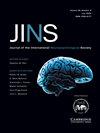年轻成年人的静态负荷和认知记忆:种族、民族和性别差异
IF 2.6
4区 心理学
Q2 CLINICAL NEUROLOGY
Journal of the International Neuropsychological Society
Pub Date : 2024-09-19
DOI:10.1017/s1355617724000298
引用次数: 0
摘要
简介虽然年龄和教育等因素与认知功能衰退的持续差异有关,但它们并不能完全解释观察到的差异,尤其是不同种族/民族和性别群体之间的差异。本研究的目的是探讨不同种族的年轻成年人群体中的代谢负荷(AL)与认知能力之间的关系。研究方法全国青少年到成人健康纵向研究》是一项针对 34-44 岁成人进行的具有全国代表性的纵向调查,本研究利用该调查第五波的 10 个免疫、心血管和代谢生物标志物的原始数据得出 AL 指数。认知之前通过单词和数字回忆得分进行记录。回归分析评估了认知回忆、AL、年龄、性别和种族/民族之间的关联。结果显示回归结果表明,与白人相比,黑人的认知能力指数得分更高(IRR = 1.09,CI = 1.01,1.19),女性的认知能力指数得分低于男性(IRR = 0.76,CI = 0.72,0.81)。在 AL 为零时,黑人(IRR = 1.2399,CI = 1.2398,1.24)和其他种族(IRR = 1.4523,CI = 1.452,1.4525)的回忆率较高,而与白人相比,西班牙裔(IRR = 0.808,CI = 0.8079,0.8081)的回忆率较低。与男性相比,女性的数字回忆率较高(IRR = 1.1976,CI = 1.1976,1.1977)。然而,在较高的、积极的 AL 水平下,黑人(IRR = 0.9554,CI = 0.9553,0.9554)、其他种族(IRR = 0.9479,CI = 0.9479,0.9479)和女性(IRR = 0.9655,CI = 0.9655,0.9655)的数字回忆能力分别显著低于白人和男性。结论在不同的 AL 水平下,不同种族和性别的回忆能力存在差异。研究结果表明,有必要进一步研究不同人群中年轻人的认知能力,其中包括对AL的研究。本文章由计算机程序翻译,如有差异,请以英文原文为准。
Allostatic load and cognitive recall among young adults: Racial, ethnic, and sex-specific variations
Introduction: While factors such as age and education have been associated with persistent differences in functional cognitive decline, they do not fully explain observed variations particularly those between different racial/ethnic and sex groups. The aim of this study was to explore the association between allostatic load (AL) and cognition in a racially diverse cohort of young adults. Methods: Utilizing Wave V of the National Longitudinal Study of Adolescent to Adult Health – a nationally representative, longitudinal survey of adults aged 34–44, this study utilized primary data from 10 immune, cardiovascular, and metabolic biomarkers to derive an AL Index. Cognition was previously recorded through word and number recall scores. Regression analysis evaluated the association between cognitive recall, AL, age, sex, and race/ethnicity. Results: Regression results indicated statistically higher AL scores among Blacks (IRR = 1.09, CI = 1.01, 1.19) compared to Whites and lower AL score among females compared to males (IRR = 0.76, CI = 0.72, 0.81). At zero AL, Blacks (IRR = 1.2399, CI = 1.2398, 1.24) and Other races (IRR = 1.4523, CI = 1.452, 1.4525) had higher recall while Hispanics (IRR = 0.808, CI = 0.8079, 0.8081) had lower recall compared to Whites. Relative to males, females had higher number recall (IRR = 1.1976, CI = 1.1976, 1.1977). However, at higher, positive levels of AL, Blacks (IRR = 0.9554, CI = 0.9553, 0.9554), Other races (IRR = 0.9479, CI = 0.9479, 0.9479) and females (IRR = 0.9655, CI = 0.9655, 0.9655) had significantly lower number recall than Whites and males respectively. Conclusions: Race and sex differences were observed in recall at different levels of AL. Findings demonstrate the need for further exploration of cognition in young adults across diverse populations that includes examination of AL.
求助全文
通过发布文献求助,成功后即可免费获取论文全文。
去求助
来源期刊
CiteScore
5.40
自引率
3.80%
发文量
185
审稿时长
4-8 weeks
期刊介绍:
The Journal of the International Neuropsychological Society is the official journal of the International Neuropsychological Society, an organization of over 4,500 international members from a variety of disciplines. The Journal of the International Neuropsychological Society welcomes original, creative, high quality research papers covering all areas of neuropsychology. The focus of articles may be primarily experimental, applied, or clinical. Contributions will broadly reflect the interest of all areas of neuropsychology, including but not limited to: development of cognitive processes, brain-behavior relationships, adult and pediatric neuropsychology, neurobehavioral syndromes (such as aphasia or apraxia), and the interfaces of neuropsychology with related areas such as behavioral neurology, neuropsychiatry, genetics, and cognitive neuroscience. Papers that utilize behavioral, neuroimaging, and electrophysiological measures are appropriate.
To assure maximum flexibility and to promote diverse mechanisms of scholarly communication, the following formats are available in addition to a Regular Research Article: Brief Communication is a shorter research article; Rapid Communication is intended for "fast breaking" new work that does not yet justify a full length article and is placed on a fast review track; Case Report is a theoretically important and unique case study; Critical Review and Short Review are thoughtful considerations of topics of importance to neuropsychology and include meta-analyses; Dialogue provides a forum for publishing two distinct positions on controversial issues in a point-counterpoint format; Special Issue and Special Section consist of several articles linked thematically; Letter to the Editor responds to recent articles published in the Journal of the International Neuropsychological Society; and Book Review, which is considered but is no longer solicited.

 求助内容:
求助内容: 应助结果提醒方式:
应助结果提醒方式:


